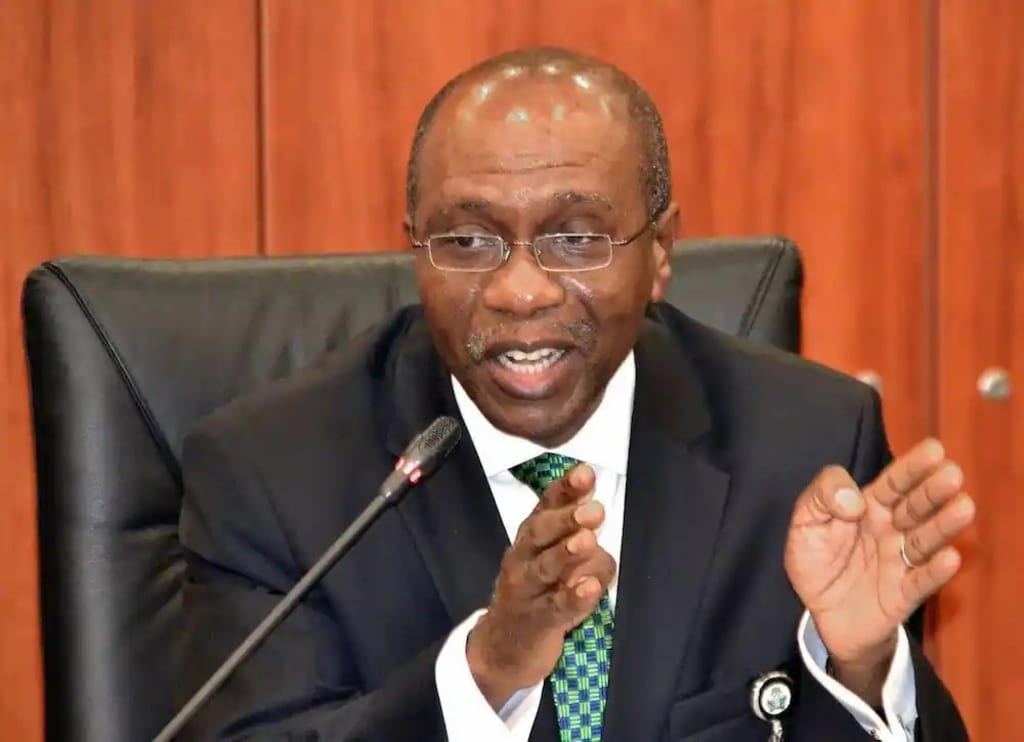Godwin Emefiele suspended as CBN Governor
President Bola Ahmed Tinubu suspends Emefiele as CBN Governor

Godwin Emefiele is a Nigerian economist and banker who has served as the Governor of the Central Bank of Nigeria (CBN) since June 3, 2014. Here are some key details about Godwin Emefiele:
Education and Early Career:
• Emefiele was born on August 4, 1961, in Lagos, Nigeria.
• He earned his Bachelor's degree in Finance in 1984 from the University of Nigeria, Nsukka.
• He later obtained a Master's degree in Business Administration (MBA) in 1986 from the University of Lagos.
• Emefiele began his banking career in 1986 at the International Merchant Bank (IMB), where he worked in various positions and rose to the position of a manager.
Professional Career:
• Emefiele joined Zenith Bank in 1990 and played a significant role in the bank's growth and development.
• He held various executive positions at Zenith Bank, including serving as the Deputy Managing Director and Group Managing Director.
• Under his leadership, Zenith Bank became one of Nigeria's leading financial institutions.
Governorship of the Central Bank of Nigeria:
• Emefiele was appointed as the Governor of the Central Bank of Nigeria (CBN) by former President Goodluck Jonathan on June 3, 2014.
• He was reappointed for a second term by President Muhammadu Buhari in June 2019.
• As the Governor of the CBN, Emefiele has implemented various monetary policies aimed at stabilizing the Nigerian economy, promoting economic growth, and maintaining price stability.
• He has also introduced measures to support sectors such as agriculture, manufacturing, and Small and Medium Enterprises (SMEs).
Initiatives and Policies:
• Emefiele has been a proponent of the diversification of the Nigerian economy, particularly through agricultural development and reducing dependency on oil.
• He implemented the Anchor Borrowers' Program, which provides financing to smallholder farmers in Nigeria.
• Emefiele has also championed policies to manage foreign exchange rates and support the stability of the Nigerian naira.
Godwin Emefiele has been recognized for his contributions to the Nigerian banking sector and his efforts to promote economic stability and development in Nigeria.
Here is an overview of Godwin Emefiele's working experience since he began his professional career:
1. International Merchant Bank (IMB):
• Emefiele started his banking career at the International Merchant Bank (IMB) in 1986.
• He worked in various positions at IMB and gained experience in banking and finance.
2. Zenith Bank:
• Emefiele joined Zenith Bank in 1990.
• He held several executive positions within the bank, demonstrating his capabilities and contributing to its growth and success.
• Emefiele served as the Deputy Managing Director of Zenith Bank before being appointed as the Group Managing Director.
3. Central Bank of Nigeria (CBN):
• On June 3, 2014, Godwin Emefiele was appointed as the Governor of the Central Bank of Nigeria (CBN) by former President Goodluck Jonathan.
• He assumed the role of leading the country's central bank and became responsible for formulating and implementing monetary policies.
• Emefiele's tenure as CBN Governor has involved addressing various economic challenges and implementing policies to promote stability and growth in Nigeria's financial sector.
It is worth noting that Godwin Emefiele's extensive experience in the banking industry, particularly his tenure at Zenith Bank, provided him with a strong foundation and expertise that he brought to his role as the Governor of the Central Bank of Nigeria.
As of my knowledge cutoff in September 2021, here are some awards and accolades that Godwin Emefiele, the Governor of the Central Bank of Nigeria, has received:
1. Forbes Best of Africa Award: In 2020, Emefiele was honored with the Forbes Best of Africa Award for his remarkable contributions to Nigeria's banking sector and his efforts in implementing policies to stabilize the economy.
2. The Banker's Global Central Bank Governor of the Year: Emefiele received this prestigious award from The Banker magazine in 2019. He was recognized for his leadership and innovative policies that contributed to the stability and development of Nigeria's financial sector.
3. African Banker of the Year: Emefiele was named African Banker of the Year in 2017 by African Banker magazine. The award acknowledged his achievements and leadership in managing the Central Bank of Nigeria during a challenging period for the country's economy.
4. Zik Leadership Prize in Public Service: Emefiele received the Zik Leadership Prize in Public Service in 2017 for his outstanding contributions to Nigeria's public service and his efforts in implementing policies to enhance economic growth and stability.
5. Honorary Doctorate Degrees: Emefiele has been awarded honorary doctorate degrees from various universities in recognition of his contributions to the banking sector and his role in Nigeria's economic development.
Please note that there might be more recent awards or accolades that Godwin Emefiele has received since my knowledge cutoff in September 2021.
Godwin Emefiele, as the Governor of the Central Bank of Nigeria (CBN), introduced and implemented the Cashless Policy in Nigeria. The policy was designed to reduce the amount of physical cash circulating in the economy and promote the use of electronic payment systems. Here are some key aspects of the Cashless Policy:
1. Objectives:
• Reduce the cost of banking services: The policy aimed to reduce the cost associated with cash handling, such as printing, transportation, and storage.
• Promote financial inclusion: By encouraging the use of electronic payment systems, the policy sought to increase access to financial services for more individuals and businesses.
• Enhance efficiency in the payment system: The Cashless Policy aimed to improve the efficiency and effectiveness of payment transactions within the Nigerian economy.
2. Transaction Charges:
• The Cashless Policy introduced transaction charges on cash withdrawals and deposits above certain thresholds.
• The charges were aimed at incentivizing individuals and businesses to adopt electronic payment methods instead of relying on cash transactions.
3. Cash Withdrawal and Deposit Limits:
• The policy established limits on cash withdrawals and deposits in banks. Individuals and businesses were encouraged to stay within these limits and conduct larger transactions electronically.
4. Channels for Electronic Payments:
• The Cashless Policy promoted various electronic payment channels such as mobile banking, internet banking, debit and credit cards, electronic fund transfers, and mobile money.
5. Implementation Phases:
• The Cashless Policy was implemented in phases across different states in Nigeria.
• The initial phase began in Lagos in 2012, followed by other states and eventually expanded nationwide.
The introduction of the Cashless Policy under Godwin Emefiele's leadership aimed to modernize Nigeria's payment system, reduce reliance on cash transactions, and promote a more efficient and inclusive financial ecosystem.
About the Creator
Great Bright
Breaking News at your finger tips, One Love keep us together!
Enjoyed the story? Support the Creator.
Subscribe for free to receive all their stories in your feed. You could also pledge your support or give them a one-off tip, letting them know you appreciate their work.






Comments
There are no comments for this story
Be the first to respond and start the conversation.